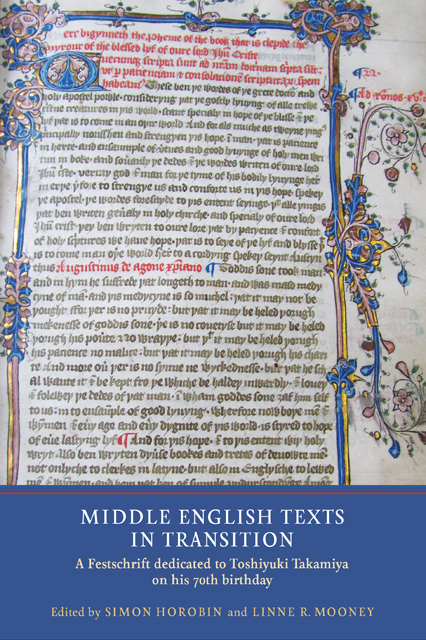 Middle English Texts in Transition
Middle English Texts in Transition Published online by Cambridge University Press: 11 March 2023
It is often repeated that sometime in 1392–3 John Gower removed his original (and delightful) dedication to Richard II from his poem Confessio Amantis, and replaced it with a rededication to Henry of Lancaster. Modern historians have generally taken this to indicate that, seven or eight years before Henry’s usurpation of Richard’s throne, Gower was so disenchanted with Richard’s rule that he was prepared to disown Richard and pin his colours to Henry Bolingbroke. It is, indeed, one of very few examples of contemporary opinion turning against Richard that can be cited. As Nigel Saul says, with reference to slightly later in the same decade, ‘It is difficult to survey in detail the popular response to Richard’s rule because of the shortage of evidence …’ Chris Given-Wilson puts it more positively: ‘There is little contemporary evidence for Richard’s unpopularity in the mid-1390s, indeed quite the opposite.’ In fact the evidence for Gower’s disaffection with Richard so early in the 1390s is also very elusive, and depends upon a chain of presumptions that might bear a closer look.
The story of Gower’s shifting allegiances owes most to Gower’s great nineteenth-century editor G. C. Macaulay, who performed an invaluable service to Gower studies by personally examining every manuscript of the Confessio Amantis that he knew of. It was Macaulay who distinguished the different forms in which the Confessio now survives, which he labelled the ‘first’, ‘second’ and ‘third recensions’. He assumed that these represented an ongoing process of revision and improvement. Thus he says of the earliest two manuscripts of the ‘second’ and ‘third’ recensions, ‘Both are contemporary with the author, and it is perhaps difficult to say which best represents his final judgement as to the form of his work.’ Macaulay also assumed that the manuscripts that we have, none of which date from early in the 1390s, represent accurately the history of the text at that time.
Here is where the story gets a little complicated. The manuscripts of the ‘first’ recension bear the dedication to King Richard. In lines 22–8 of the Prologue, Gower writes:
And for that few men endite
In oure englissh, I thenke make
A bok for king Richardes sake,
To whom belongeth my ligeance
With al myn hertes obeissance
In al that evere a liege man
Unto his king may doon or can.
To save this book to your Kindle, first ensure [email protected] is added to your Approved Personal Document E-mail List under your Personal Document Settings on the Manage Your Content and Devices page of your Amazon account. Then enter the ‘name’ part of your Kindle email address below. Find out more about saving to your Kindle.
Note you can select to save to either the @free.kindle.com or @kindle.com variations. ‘@free.kindle.com’ emails are free but can only be saved to your device when it is connected to wi-fi. ‘@kindle.com’ emails can be delivered even when you are not connected to wi-fi, but note that service fees apply.
Find out more about the Kindle Personal Document Service.
To save content items to your account, please confirm that you agree to abide by our usage policies. If this is the first time you use this feature, you will be asked to authorise Cambridge Core to connect with your account. Find out more about saving content to Dropbox.
To save content items to your account, please confirm that you agree to abide by our usage policies. If this is the first time you use this feature, you will be asked to authorise Cambridge Core to connect with your account. Find out more about saving content to Google Drive.